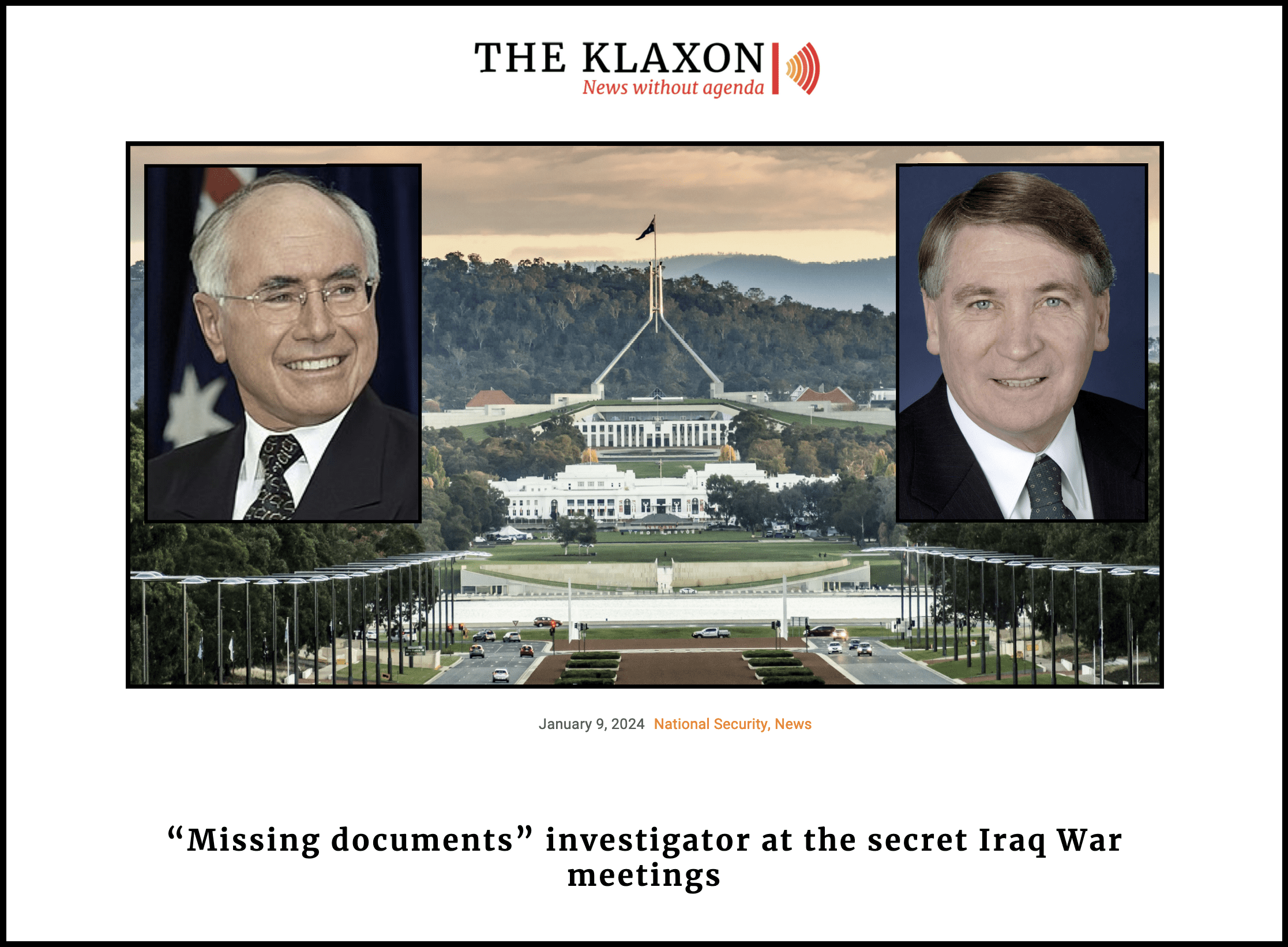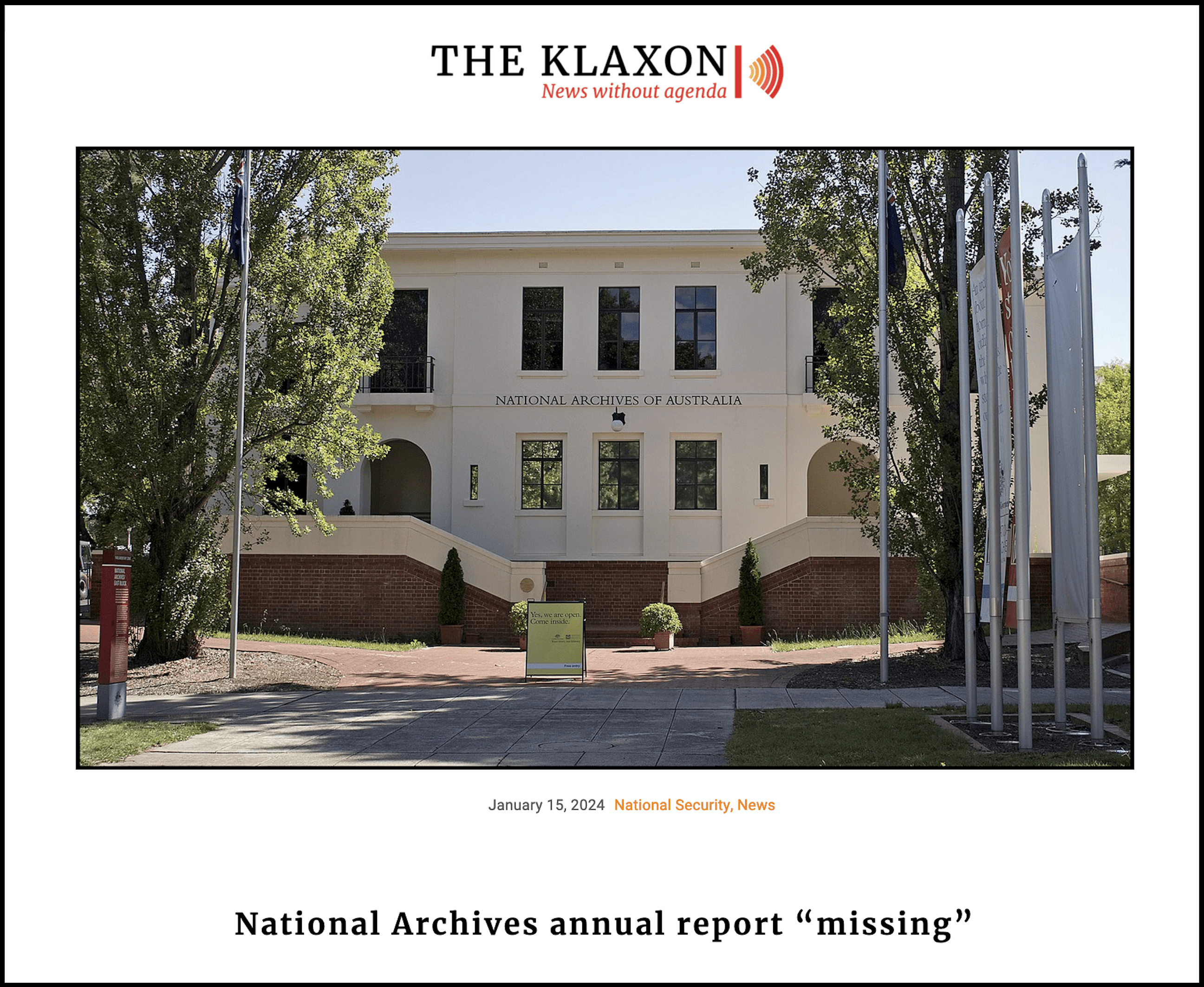Appreciate our quality journalism? Please subscribe here
DONATE
EXCLUSIVE
The National Archives of Australia has known about the “missing” 2003 cabinet papers for up to a year — potentially as far back as 2022 — despite the Federal Government repeatedly suggesting the matter only surfaced days before Christmas.
The National Archives says it first became aware of the “missing” cabinet papers during its “annual proactive Cabinet release project” — which started as far back as “early December” 2022.
The agency has made the comments in response to questions The Klaxon put to National Archives Director-General Simon Froude regarding the, at least, 79 “missing” cabinet papers.
“The annual proactive Cabinet release project commences around 1 year prior, where we identify and prepare records for embargoed release to media in early December each year,” the agency said in a written statement. (Emphasis by National Archives).
On January 1 it emerged, in an event unprecedented in Australian history, that the Department of Prime Minister and Cabinet (PM&C) had not, in 2020, handed over to the National Archives all the cabinet papers from 2003.
Among those not handed over were documents from the secret 2003 meetings of Australia’s National Security Committee regarding Australia’s highly controversial decision to join the US-led invasion of Iraq.
(In 2020 PM&C was under then Coalition Prime Minister Scott Morrison).
Please SUBSCRIBE HERE and support our quality journalism

National Archives of Australia director-general Simon Froude. Photo: Public Sector Network/YouTube
The Federal Government is accused of cover-up over over the affair, including by Federal independent Andrew Wilkie, a former Federal intelligence analyst.
Serious doubts have been raised as to how National Archives could not have been long aware key documents were missing, given it received the rest of the documents in 2020.
The latest revelations raise serious questions for Prime Minister Anthony Albanese and his PM&C.
“The current head [of PM&C Glyn Davis] was only notified of the failure to forward the 78 documents just around just before Christmas,” Albanese said on January 3.
On January 1, in a statement revealing the scandal, Albanese’s PM&C said:
“The additional records were located on 19 December 2023”.
“The Department [PM&C] and Archives jointly inspected the records on 22 December 2023”, PM&C said.
The statement cites no author and quotes no individual.

The Klaxon’s January 9 report. Source: The Klaxon
PM&C has since January 1 refused to provide answers to a series of questions from The Klaxon, including when “PM&C” (not its Secretary Davis) first became aware of the “missing” documents.
In its January 1 statement, although providing no evidence, PM&C said the failure to hand over the documents was “due to apparent administrative oversights”.
“These oversights were likely as a result of Covid-19 disruptions at the time,” it said.
Again providing no evidence, PM&C said the “apparent administrative oversights” were “by the Department (PMC), the Archives and security agencies”.
The 2003 cabinet papers (although not all of them) had been transferred from PM&C to National Archives in 2020, which was the “normal process”.
“[This] allows time for appropriate consultation with relevant agencies to ensure content released is compliant with exemptions in the Archives Act 1983,” the PM&C said.
That National Archives uses the records to conduct “appropriate consultation” with the “relevant agencies” up to three years or more in advance raises yet further questions of who knew what and when.
So too does the fact that each year National Archives releases a “cabinet papers in context” explainer, a substantial document compiled by an expert who has had extended access to the cabinet papers long before January 1.
“Iraq was the dominant issue that year (2003)” – National Archives explainer
Critics have stated as implausible that an expert writing about the 2003 cabinet papers, and well in advance, could have failed to have noticed key documents — the most important cabinet documents from 2003 — were “missing”.
The first sentence of the 18,000-word National Archives explainer is: “The Howard Government’s decision to participate in the Iraq War dominated Australian politics in 2003”.
“Iraq was the dominant issue that year,” it states.
The Klaxon yesterday revealed the 2022-23 annual report of the National Archives is “missing” from public records, three months after the October 15 legislated deadline.
The agency was granted an “extension” until November 30 by Arts Minister Tony Burke, its responsible minister.
Please SUBSCRIBE HERE and support our quality journalism

The Klaxon’s expose yesterday. Source: The Klaxon
Archives says it met that deadline, yet Burke has not released the report, despite the process usually taking a handful of days at most.
The annual reports of Commonwealth entities, including National Archives, are required to include details of “significant events” in the year.
National Archives Director-General Froude was appointed in the final weeks of the Morrison Government, and started in the role on March 23, 2022, two days after the Coalition was ousted at the federal election after nine years in power.
When The Klaxon asked Froude, in written questions, when National Archives first became aware of the “missing” documents, Archives responded: “National Archives became aware during the process of preparing the 2003 cabinet records for release”.
The Klaxon pointed out this could be at any time since 2020 — as that was when it received the cache of 2003 cabinet records from PM&C, in an act of “preparing the 2003 cabinet records for release”.
Archives responded: “The annual proactive Cabinet release project commences around 1 year prior, where we identify and prepare records for embargoed release to media in early December each year”.
Asked whether National Archives first became aware of the missing documents “after it had commenced the annual proactive Cabinet release project for the January 1, 2024, release”, Archives responded: “This is correct”.
“National Archives is not able to provide any further information while the external review is ongoing,” it said.
In its January 1 statement, PM&C announced its Secretary Dyer had appointed a “Mr Dennis Richardson” to conduct an “independent review” of “the 2020 transfer process” and to “confirm that all relevant records have been transferred to the Archives”.

Dennis Richardson was ASIO boss in 2003. Source: ABC
As previously revealed, Richardson was himself present at — and an intimate contributor to — the 2003 meetings of the National Security Committee.
Richardson was Director-General of ASIO from 1996 to 2005, having been appointed by Coalition Prime Minister John Howard.
A small number of senior government officials, including the head of ASIO, “attended all meetings”, with “ministers on one side of the table and officials on the other”, says the document.
Dennis Richardson
1996–2005: ASIO Director-General
2005-2010: Australian Ambassador to US
Jan 2010-Oct 2012: Secretary of DFAT
Oct 2012-May 2017: Secretary of Department of Defence
Richardson departed the public service in 2017. He has been engaged by PM&C to conduct the “review”, for an undisclosed sum, as a private citizen.
As previously reported, since 2018 Richardson has been given three other Federal contracts, totalling $1.03 million, including a $50,000-a-month contract from PM&C in August last year.
On January 3 Albanese said there was a need for “transparency” and “a need for the release of these documents”.
The Prime Minister said Richardson would “report within the next two weeks”.
Two weeks is tomorrow.
More to come….
WAIT! BEFORE YOU GO: As you can see above, truly independent, quality journalism is vital to our democracy. We need your help to keep doing this work. Please SUBSCRIBE HERE or support us by making a ONE-OFF DONATION. Thank you.
Anthony Klan
Editor, The Klaxon
Help us get the truth out from as little as $10/month.
Unleash the excitement of playing your favorite casino games from the comfort of your own home or on the go. With real money online casinos in South Africa, the possibilities are endless. Whether you’re into classic slots, progressive jackpots, or live dealer games, you’ll find it all at your fingertips. Join the millions of players enjoying the thrill of real money gambling and see if today is your lucky day!
The need for fearless, independent media has never been greater. Journalism is on its knees – and the media landscape is riddled with vested interests. Please consider subscribing for as little as $10 a month to help us keep holding the powerful to account.






